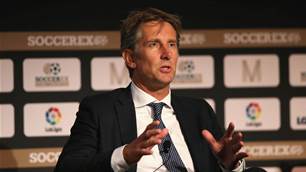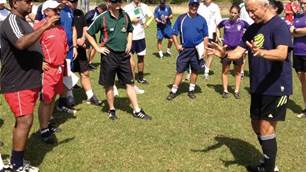Australia’s national youth development system is fractured, lacking direction and, say its critics, run for the wrong reasons. Yet there is a ray of hope.
Page 1 of 3 | Single page
A craggy-faced old man gingerly makes his way along the grassy embankment next to the bumpy pitch. Walking stick in hand, baggy tracksuit hanging off his gaunt figure, a bone-chilling gust of wind sweeps in and tousles his grey hair as the sound of a 747 in the far off distance rumbles through Sydney’s morning sky.
We’re at Bossley Park, which, it should be said, will not feature on any postcards of Sydney. While plane loads of enthusiastic tourists flock to the Bridge, Opera House and Bondi Beach, and enjoy the hip bars and gorgeous beaches of the city’s Eastern Suburbs and North Shore, Bossley Park in Sydney’s western suburbs is like Ugly Betty. It’s got a heart of gold, but it’s working class central and drab as dishwater. And that’s exactly the way David Lee likes it.
“You can’t teach kids who live close to the beach – too many distractions,” says Lee in an accent as ocker as Paul Hogan as he rests his walking stick next to a wooden table and sits down for a chat.
FourFourTwo is watching the IQ Football Academy go through its paces at a deserted high school during school holidays. The program is Lee’s brainchild. Coaching kids is still his life, even though he’s in his 70s now. It’s Lee’s philosophy of coaching that IQ – intensity and quality – is built on.
On the pitch, effervescent staff coach Jeff Stanmore cajoles the youngsters. “One touch, one touch,” he instructs as the players, aged around 12 to 14, set up in a triangle, pass, dummy, lay off the ball and move into space in one free-flowing movement. “You don’t need two touches, if you do, get a girlfriend!” yells Stanmore as he intently follows each player’s movement on and off the ball.
Lee explains the academy’s philosophy, and the reasons he set up his own academy.
“IQ is about breeding smarter, faster players,” says Lee. “This is based on the three speeds in football: speed of movement, speed of ball and speed of thought. Speed of thought controls the other two. Here, we attempt to increase the speed of thought of players by developing their technical ability to a point where the player does not need to concentrate 100 percent on the control and distribution of the ball. Their first touch should be that good it becomes a learned behaviour and is second nature to them. The first nature has to be the decision.”
He adds that they are not “results driven” in a sense of winning matches. “The philosophy is to create a competitive environment as opposed to a competition environment, whereby the primary focus is on individual technical development.”
On a nearby tennis court, IQ staff are filming players sprinting to monitor technique and ascertain whether they have the requisite natural foot speed over five metres.
These ideas – mostly inspired by English coach Eric Worthington, a former director of coaching in this country, and Yugoslav guru Ivan Toplak – have guided Lee’s career as a coach. A career that was “in the development system” – that is, the Football NSW system – until he quit nine years ago disillusioned with the direction we were heading.
“The reason I quit in 1998 was because they introduced a program to help develop kids, but you had to pay for it,” says Lee. “That’s when I got out. The scholarships that Harry [Kewell] and Emo [Brett Emerton] went on were finished up. The federation is run for all the wrong reasons. It’s run to make a profit. Coerver coaching’s come in. You can become a Coerver coach with three hours of training. It’s bullshit.
“Here, I make the ball do the work; they make the player do the work. You don’t use tricks. Playing a ball first time and moving to get it back again is what it’s all about.”
Lee and Stanmore – who is also studying for his masters in sports science at university – are now seen as mavericks by the system.
“It doesn’t matter how many step-overs you do or if you can make the ball disappear up your arse, if you can’t pass the ball you can’t play the game,” says Stanmore. “All teams can do with maybe one of those players. At Coerver, you receive acclaim for a trick, in football the only acclaim you get is sticking the ball between the posts.”
The pair are concerned about the corporatisation of youth development which they say isn’t producing better, smarter players. They are also keen to point out that IQ charges a minimal amount (about $5 per hour of training). In fact, they say they’ve had preliminary talks with a well-known Socceroo’s representatives to run a school based on Lee’s principles that would be free of charge.
They are also deeply worried that some state federations are no longer focused on quality of individual. “The standard of the players coming through to the AIS is terrible,” says Lee, frustrated, “but no-one can say because they’re looking after their own jobs – I don’t blame them for that. The whole thing’s got holes in it. I don’t know where to start. If you’re not in this so-called development program, you can’t get in the state youth teams. And if you can’t get into the state teams, you can’t get into the institutes.
“It’s all in Eric [Worthington]’s book. He sets out a plan. But they [the Federation] do it the other way around. They start them in a competitive game. When they can’t play they take them back to the beginning. Then they become de-motivated and drop out.
I think it’s something like 96 percent stop playing by the time they’re 16. It’s not psychology – psychology’s a big word – it’s just understanding,” he says exasperated.
The emphasis at IQ is on technique, using technique in a skilful manner, and maintaining a level of motivation. These kids actually look like they’re enjoying themselves. Which is not surprising given the pair have worked out some very basic ideas of player motivation.
“You’ve got to be motivated to improve, that’s the first thing you check,” says Lee. “Ten percent usually want to be there, 90 percent don’t; it’s the parents who want them to be there. And it’s very hard to tell. You’ve got to run tests. They’ve got to be intrinsically motivated, not extrinsically.”
Lee tells the story of one 16-year-old who recently spent five weeks at Bolton Wanderers. He impressed at the Reebok with his technique but the trial – in the bitter cold of an English winter – crushed his motivation.
“He comes from down near the ocean,” says Lee. “His family’s not short of a quid so if you’re thinking long term you wouldn’t take him. He’s gone overseas and found out he wasn’t too fussed about it. He’s a good kid and he’s quickly worked it out it’s not good for him.” That player is now helping coach the youngsters at IQ.
“When was the last time we produced an outstanding talent?” Lee asks. “We need to produce one outstanding player a year. That’s what’s alarming about the system.”
As we slowly walk along the perimeter of the pitch, youngsters in various Euro football shirts edge forward to shake Lee’s hands. Respect is clear, for he is also known as “David Lee: Harry Kewell’s junior coach”.
We’re at Bossley Park, which, it should be said, will not feature on any postcards of Sydney. While plane loads of enthusiastic tourists flock to the Bridge, Opera House and Bondi Beach, and enjoy the hip bars and gorgeous beaches of the city’s Eastern Suburbs and North Shore, Bossley Park in Sydney’s western suburbs is like Ugly Betty. It’s got a heart of gold, but it’s working class central and drab as dishwater. And that’s exactly the way David Lee likes it.
“You can’t teach kids who live close to the beach – too many distractions,” says Lee in an accent as ocker as Paul Hogan as he rests his walking stick next to a wooden table and sits down for a chat.
FourFourTwo is watching the IQ Football Academy go through its paces at a deserted high school during school holidays. The program is Lee’s brainchild. Coaching kids is still his life, even though he’s in his 70s now. It’s Lee’s philosophy of coaching that IQ – intensity and quality – is built on.
On the pitch, effervescent staff coach Jeff Stanmore cajoles the youngsters. “One touch, one touch,” he instructs as the players, aged around 12 to 14, set up in a triangle, pass, dummy, lay off the ball and move into space in one free-flowing movement. “You don’t need two touches, if you do, get a girlfriend!” yells Stanmore as he intently follows each player’s movement on and off the ball.
Lee explains the academy’s philosophy, and the reasons he set up his own academy.
“IQ is about breeding smarter, faster players,” says Lee. “This is based on the three speeds in football: speed of movement, speed of ball and speed of thought. Speed of thought controls the other two. Here, we attempt to increase the speed of thought of players by developing their technical ability to a point where the player does not need to concentrate 100 percent on the control and distribution of the ball. Their first touch should be that good it becomes a learned behaviour and is second nature to them. The first nature has to be the decision.”
He adds that they are not “results driven” in a sense of winning matches. “The philosophy is to create a competitive environment as opposed to a competition environment, whereby the primary focus is on individual technical development.”
On a nearby tennis court, IQ staff are filming players sprinting to monitor technique and ascertain whether they have the requisite natural foot speed over five metres.
These ideas – mostly inspired by English coach Eric Worthington, a former director of coaching in this country, and Yugoslav guru Ivan Toplak – have guided Lee’s career as a coach. A career that was “in the development system” – that is, the Football NSW system – until he quit nine years ago disillusioned with the direction we were heading.
“The reason I quit in 1998 was because they introduced a program to help develop kids, but you had to pay for it,” says Lee. “That’s when I got out. The scholarships that Harry [Kewell] and Emo [Brett Emerton] went on were finished up. The federation is run for all the wrong reasons. It’s run to make a profit. Coerver coaching’s come in. You can become a Coerver coach with three hours of training. It’s bullshit.
“Here, I make the ball do the work; they make the player do the work. You don’t use tricks. Playing a ball first time and moving to get it back again is what it’s all about.”
Lee and Stanmore – who is also studying for his masters in sports science at university – are now seen as mavericks by the system.
“It doesn’t matter how many step-overs you do or if you can make the ball disappear up your arse, if you can’t pass the ball you can’t play the game,” says Stanmore. “All teams can do with maybe one of those players. At Coerver, you receive acclaim for a trick, in football the only acclaim you get is sticking the ball between the posts.”
The pair are concerned about the corporatisation of youth development which they say isn’t producing better, smarter players. They are also keen to point out that IQ charges a minimal amount (about $5 per hour of training). In fact, they say they’ve had preliminary talks with a well-known Socceroo’s representatives to run a school based on Lee’s principles that would be free of charge.
They are also deeply worried that some state federations are no longer focused on quality of individual. “The standard of the players coming through to the AIS is terrible,” says Lee, frustrated, “but no-one can say because they’re looking after their own jobs – I don’t blame them for that. The whole thing’s got holes in it. I don’t know where to start. If you’re not in this so-called development program, you can’t get in the state youth teams. And if you can’t get into the state teams, you can’t get into the institutes.
“It’s all in Eric [Worthington]’s book. He sets out a plan. But they [the Federation] do it the other way around. They start them in a competitive game. When they can’t play they take them back to the beginning. Then they become de-motivated and drop out.
I think it’s something like 96 percent stop playing by the time they’re 16. It’s not psychology – psychology’s a big word – it’s just understanding,” he says exasperated.
The emphasis at IQ is on technique, using technique in a skilful manner, and maintaining a level of motivation. These kids actually look like they’re enjoying themselves. Which is not surprising given the pair have worked out some very basic ideas of player motivation.
“You’ve got to be motivated to improve, that’s the first thing you check,” says Lee. “Ten percent usually want to be there, 90 percent don’t; it’s the parents who want them to be there. And it’s very hard to tell. You’ve got to run tests. They’ve got to be intrinsically motivated, not extrinsically.”
Lee tells the story of one 16-year-old who recently spent five weeks at Bolton Wanderers. He impressed at the Reebok with his technique but the trial – in the bitter cold of an English winter – crushed his motivation.
“He comes from down near the ocean,” says Lee. “His family’s not short of a quid so if you’re thinking long term you wouldn’t take him. He’s gone overseas and found out he wasn’t too fussed about it. He’s a good kid and he’s quickly worked it out it’s not good for him.” That player is now helping coach the youngsters at IQ.
“When was the last time we produced an outstanding talent?” Lee asks. “We need to produce one outstanding player a year. That’s what’s alarming about the system.”
As we slowly walk along the perimeter of the pitch, youngsters in various Euro football shirts edge forward to shake Lee’s hands. Respect is clear, for he is also known as “David Lee: Harry Kewell’s junior coach”.
Related Articles

Sydney FC and Ajax form youth partnership

Youth United disunited as splits emerge













